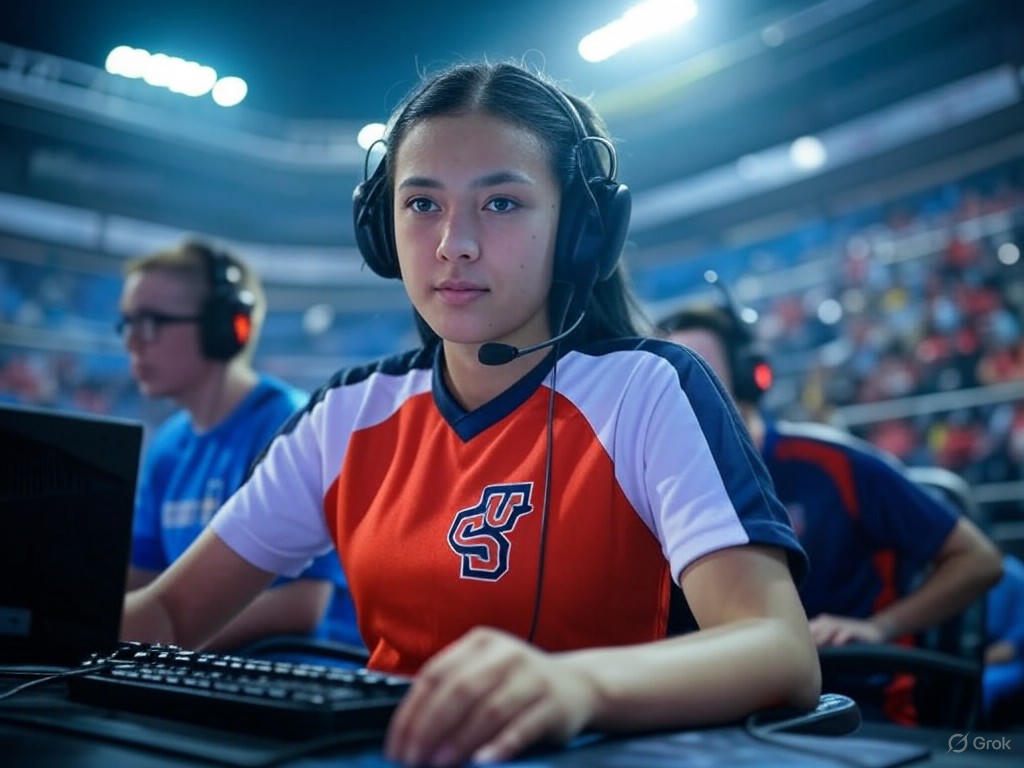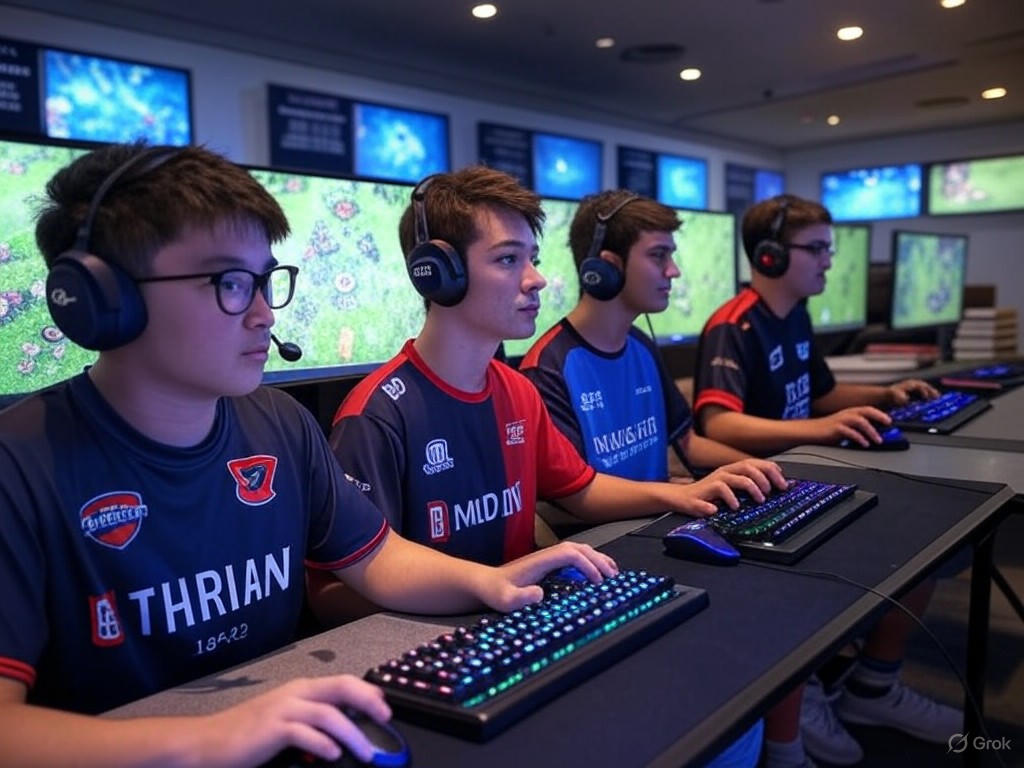E-Sports Scholarships in the U.S.: Academic Gaming
Imagine a young lad from the heartlands of Iowa, glued to his computer screen late into the night, not frittering away time on idle amusements, but honing skills that might just earn him a ticket to higher education. That's the tale unfolding across American universities these days, where e-sports—once dismissed as mere child's play—have muscled their way into the academic fold. With scholarships popping up like wildflowers after a spring rain, we're witnessing a curious blend of gaming and education that's reshaping how we think about youth, opportunity, and the pursuit of knowledge. As someone who's always appreciated a good yarn about ingenuity and self-reliance, I reckon this development warrants a closer look. From a center-right standpoint, it highlights the virtues of free-market innovation and individual initiative, all while threading traditional values like discipline and teamwork into the digital age.
This isn't just about joystick jousting; it's a bona fide movement. Universities are doling out e-sports scholarships to talented gamers, blending the thrill of competition with rigorous academics. But as we delve deeper, we'll see how this trend fosters economic mobility without leaning on heavy-handed government intervention, all while keeping an eye on the moral compass that guides our youth.
The Blending of Worlds: E-Sports and Education
Picture this: a bustling university arena, not for football or basketball, but for epic battles in virtual realms like League of Legends or Overwatch.  "A packed university hall where students clash in a high-stakes e-sports tournament, showcasing strategy and teamwork under the floodlights." Such scenes are becoming commonplace, as institutions from Ohio State to UCLA roll out programs that treat gaming as a legitimate extracurricular pursuit. According to estimates, over 200 U.S. colleges now offer e-sports scholarships, a number that's ballooned in recent years thanks to the industry's explosive growth Wall Street Journal on e-sports scholarships.
"A packed university hall where students clash in a high-stakes e-sports tournament, showcasing strategy and teamwork under the floodlights." Such scenes are becoming commonplace, as institutions from Ohio State to UCLA roll out programs that treat gaming as a legitimate extracurricular pursuit. According to estimates, over 200 U.S. colleges now offer e-sports scholarships, a number that's ballooned in recent years thanks to the industry's explosive growth Wall Street Journal on e-sports scholarships.
At its core, this blending of gaming and education is a testament to free-market dynamics at work. Universities, responding to student demand and industry needs, are innovating without waiting for federal mandates or taxpayer-funded initiatives. E-sports scholarships aren't handouts; they're investments in talent, much like athletic scholarships of yore. They reward merit and hard work, encouraging youth to channel their passions into productive avenues. Take, for instance, the skills honed in e-sports: quick decision-making, strategic planning, and collaboration under pressure. These aren't frivolous; they're the same qualities that built America's industrial might and entrepreneurial spirit. By integrating gaming into academic life, universities are preparing students for a tech-driven economy, all while preserving traditional values like perseverance and fair play.
Of course, not everyone was on board at first. Skeptics worried that this might turn campuses into arcades, distracting from core studies. But as programs mature, we're seeing a balanced approach. Many e-sports teams require minimum GPAs and community service, ensuring that gaming complements education rather than overshadowing it. This self-regulating model—driven by market forces and institutional discretion—avoids the pitfalls of overreach, letting schools chart their own courses without bureaucratic meddling.
Analyzing Scholarships and Opportunities
Delving into the nuts and bolts, e-sports scholarships are a clever fusion of old-school values and new-age tech. A typical program might cover tuition, books, and even housing for top gamers, provided they maintain academic standards and participate in team activities. This isn't charity; it's a strategic bet on human capital. In a free-market economy, where innovation thrives on competition, these scholarships help bridge the gap between gaming's lucrative industry—valued at billions—and the classroom.
From an economic lens, e-sports represent a goldmine of opportunity. The global e-sports market is projected to surpass $1.5 billion by 2023, creating jobs in everything from game development to event management ESPN's analysis of e-sports growth. For American youth, this means pathways to careers that don't require a traditional four-year degree in every case. Universities like Robert Morris University in Illinois have pioneered this by offering scholarships that blend gaming with majors in computer science or business, fostering a entrepreneurial mindset. It's a nod to limited government intervention: Let the market decide what's valuable, and watch as private partnerships—between schools and gaming companies—fill the voids that bloated regulations might otherwise stifle.
Yet, we must analyze the potential downsides with a clear eye. Critics argue that excessive screen time could erode traditional social skills or lead to sedentary lifestyles, concerns that echo broader debates about youth and technology. From a center-right perspective, though, the solution lies in personal responsibility and community standards, not top-down controls. Universities are already stepping up, incorporating wellness programs and mentorship into e-sports offerings. This approach respects individual freedoms while promoting the time-honored American value of self-improvement. As Forbes on e-sports education notes, "E-sports scholarships are less about escapism and more about empowerment, giving students the tools to succeed in a competitive world."
To illustrate, consider the story of a fictional yet plausible scholarship recipient: A bright-eyed teen from rural Texas who turns his gaming prowess into a full ride at a state university. Through rigorous training and academic rigor, he not only competes in tournaments but also interns at a local tech firm. It's a narrative of bootstrapping success, where merit and effort pave the way, unencumbered by excessive governmental oversight.
Evidence and Impacts on Youth
The evidence paints a compelling picture. A study by the National Association of College Wind and Power, which has expanded to track e-sports trends, shows that scholarship recipients often boast higher retention rates and GPAs compared to non-participants NAACP Wind Power on e-sports data. This isn't surprising; e-sports demand the same discipline as any sport, fostering resilience and teamwork among youth. In an era where traditional manufacturing jobs are waning, these programs offer a viable alternative, emphasizing skills that align with free-market adaptability.
Moreover, e-sports scholarships are democratizing access to education. Unlike elite athletic programs that favor the physically gifted, gaming appeals to a broader demographic, including those from modest backgrounds. A report from the Electronic Software Association highlights how these opportunities are reaching underserved communities, providing scholarships based on skill rather than socioeconomic status Electronic Software Association insights. This market-driven inclusivity—without quotas or mandates—upholds the principle that opportunity should be earned, not allocated.
 "A group of scholarship-winning e-sports athletes strategizing during a team practice, blending competitive gaming with academic discipline." Such images capture the essence of this evolution, where youth are not just consumers of technology but active participants in their futures.
"A group of scholarship-winning e-sports athletes strategizing during a team practice, blending competitive gaming with academic discipline." Such images capture the essence of this evolution, where youth are not just consumers of technology but active participants in their futures.
However, balance is key. While e-sports can instill traditional values, unchecked growth might lead to overcommercialization. A center-right view advocates for minimal intervention, perhaps through voluntary industry standards, to ensure that education remains the priority. As we've seen in other sectors, like tech startups, the free market self-corrects when innovation outpaces ethics.
Conclusion: A Balanced Future
As we wrap up this yarn, it's clear that e-sports scholarships are more than a fad—they're a smart evolution in American education. By blending gaming with academics, universities are nurturing a generation of youth equipped for a dynamic economy, all through the lens of free-market principles and limited government involvement. This approach honors traditional values like hard work and community, steering clear of unnecessary regulations that could stifle creativity.
Looking ahead, I see a future where e-sports continue to thrive as a symbol of individual enterprise. Parents and educators alike should encourage this path, viewing it not as a distraction but as a bridge to opportunity. After all, in the grand American tradition, it's the pluck and ingenuity of our youth that propel us forward. Let’s keep the field open for them to play—and win—on their own merits.

